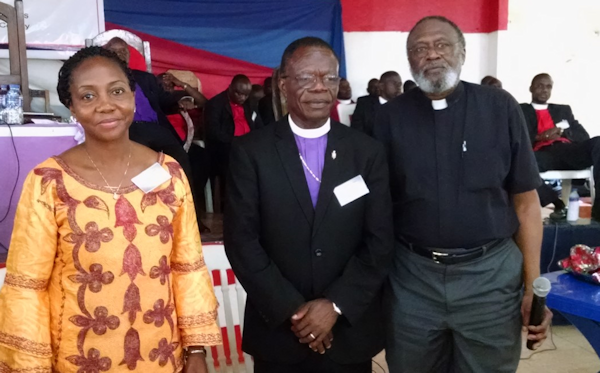The Michigan Area’s relationship with the nation of Liberia spans decades with transforming love.
JOHN E. HARNISH
Michigan Area Communication
“Incredible joy in the face of situations we Americans would find intolerable. “ That’s how District Superintendent Bill Haggard described the United Methodists of Liberia. In February of this year Bill represented the West Michigan Conference Cabinet on a trip to attend the Liberian Annual Conference. He said he found Liberia to be a “beautiful country with many needs, but also lots of joy”. Driving along the highway there would be parties with bonfires every night. And he found the vitality and energy of the United Methodist Annual Conference to be both “beautiful and challenging.”
Liberia, a nation settled by freed slaves from America, has a long history of relationship with the United States and with the United Methodist Church. For Michigan Methodists that relationship goes back to Missionary Nancy Lightfoot who served there for many years with the support of congregations from across the state. Lightfoot, originally a nurse at the Ganta Methodist Hospital, began a translation of the Bible into the native language in 1989. It was completed in 2000 and she died in a car accident in 2001.
Rev. Emmanuel Bailey came to Michigan as a youth, graduated from Methodist Theological School in Ohio and served churches in the Detroit Conference until he returned to Liberia to serve on the Conference staff and then become the president of United Methodist University. Rev. Emmanuel Giddings immigrated to Michigan and served churches in the conference before returning to his homeland. Today he leads a national literacy program. Rev. Dr. Charles Boayue came to Michigan as a college student intern at Metropolitan UMC in Detroit. His intent was to return to Liberia but he was unable to because of the Civil War. He discovered the depth of the relationship between Detroit Conference and Liberia and decided he could serve his homeland while serving here. He is currently the District Superintendent of the Detroit Renaissance District and was one of our state’s nominees for Bishop. Currently two other Liberian pastors serve in Michigan. Rev. Albert Barchue is the pastor in Negaunee in the Upper Peninsula and Rev. Harris Dunn is the pastor at Melvindale and Denton.
In the late 1980’s Rev. John Kershaw led the first VIM team from Detroit to Liberia and the conference began filling containers for Liberia at the Annual Conference session. The founding of the Bishop Judith Craig Children’s Village cemented the relationship until finally in 1998, Bishop Arthur Kulah came to the Detroit Conference to sign the formal “Covenant Relationship” with the Liberian Annual Conference. Over the years the Liberia Task Force has guided the conference in our on-going work together including annual offerings totaling close $20,000 per year in support of the Judith Craig Children’s Village, pastors’ salary support, a truck for the annual conference and support of the Ganta Methodist Hospital. The Detroit Conference has sent representatives to their Annual Conference and have welcomed Liberian guests to ours. Local churches and districts have established partnerships and have sent mission teams to work alongside our Liberian brothers and sisters in local churches and schools. In addition, congregations in the Detroit Conference are in covenant relationship with several United Methodist missionaries serving in Liberia: Princess Jusu, Helen Roberts-Evans, and Mary Randall Zigbuo.
Former Assistant to the Bishop Terry Euper says, “The needs in Liberia are so great, but it inspires you to be there—their spirit, their joy in the midst of the struggle. Our role is to be there to encourage them, to stand with them and to learn from them.”
Today the Detroit and West Michigan Conferences share in a Covenant Relationship with Haiti and the Detroit Conference continues the relationship with Liberia. These international linkages represent the global reach of the United Methodist Connection fulfilling John Wesley’s vision, “The People Called Methodist are one in all the earth.” Superintendent Charles Boayue says, “These partnerships provide a global platform for our work, relationships which bind us in mission and remind us that God has the whole world in God’s hands.” Looking back over the years, Boayue reflects, “The relationship between Michigan and Liberia began in one of Liberia’s darkest days, the bloody Civil War. As the nation seemed to be disintegrating, the presence of Michigan Methodists became a sign of hope, a light at the end of a dark tunnel. We gave hope to the Liberians until today when a United Methodist, Ellen Johnson Sirleaf, serves as the first woman president of an African nation.”
On his recent trip to Liberia, Bill Haggard, who has three foster sons from Liberia, spent time in the West Point area of Liberia’s capital Monrovia. During the Ebola crisis, the people of West Point were distrustful of the government and questioned the spread of the disease until the United Methodist leaders enabled them to understand the threat. Thanks in part to the work of the United Methodists, that particular region was spared the worst of the epidemic. During the crisis, Bishop John Innis said, “Like death, which brings hopelessness and despair, the resurrection of Jesus Christ brings hope and courage. The Church in West Africa holds to this truth despite the fear, misunderstanding, hopelessness and pain that is being experienced by our people. In Christ alone Christians can see beyond the smell of hopelessness to the unspeakable joy that hope brings.”
Last Updated on January 10, 2023

